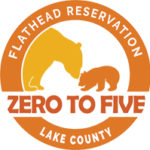
This month the Leading the Way profile is Jessica Johnson. She has been working in public education for nearly two decades, as a teacher and now as the Ronan High School Vice Principal. Johnson has been active with a variety of community programs and was the 2016 winner of the 27th Montana Statehood Centennial Bell Award for History Teacher of the Year at the seventh-12th grade level.
Tell us a little bit about your background…
I was born in St. Ignatius, Montana and was raised on my family’s farm there. I have three younger sisters and countless aunts, uncles, and cousins. My father’s family were homesteaders, who migrated to Montana. My mother’s family is Native American and has persevered through the challenges that were brought before them. Using these diverse elements from my personal history, I am able to connect strongly with my community. I currently live in Ronan and am married. My husband and I have two children. We enjoy many activities such as traveling, community events, and I love no place more than my grandparent’s home on Finley Point. I started my education within the CSKT Head Start Program in St Ignatius and graduated from St. Ignatius High School in 2000. I have earned two Bachelor’s degrees from MSU-Bozeman in Political Science/Public Administration and Secondary Education/Social Studies Broadfield. I have also earned a Master’s in Curriculum & Instruction/Special Education from the University of Montana and a Master’s of Educational Leadership from MSU-Bozeman. I have worked in the Ronan School District for the past 16 years as a teacher and administrator. I love to learn and am often driven to use education to help better serve my students.
Describe the work you do with families and children…
As an educator, I work with students and families as they navigate educational goals, personal goals, and their social/emotional health. I also work to support my staff as they work tirelessly to serve our students. One of my many goals is to help students realize that education is not just about academics, but also about how to constructively advocate for themselves as they explore different areas of interest. This may include areas of academics, job-skills, seeking help, and much more. I also work closely with other agencies that can provide support and guidance to our students and families. One area that I work on is bringing stakeholders together to help our students bring voice and relevance to their interests. This is a very strategic part of my job as it requires facilitating many needs/interests into action. This work cannot be done without a sense of belonging and collaboration.
What do you think people misunderstand about the work being done with children age 0-5?
I think that many people don’t realize that working with children is more than just reading/writing. It requires that relationships and trust be present in order for other ‘risks’ to be supported and learning to take place. People that work with children are helping them learn how to navigate the world, which can be very scary and overwhelming. This work requires that parents/guardians trust those that are helping educate their children and bring them in as partners. Children come to the classroom with a multitude of experiences and trauma that must be recognized, as they attempt to learn.
How would you describe the most important work that needs to happen for young children?
Young children need people that are willing to help them see their strengths and to set obtainable goals/standards for them. I strongly believe that children will rise to any challenge/standard if they have someone supporting them along the way. Children need to know that there are safe spaces/people for them to take risks while they take on new challenges.
If you could change one social factor impacting families and young children what would it be and why?
If I could change one social factor that impacts families, it would be poverty. So many of our children miss out on needs being met, due to the barriers that their socio-economic status creates. These barriers include basic necessities, access to education, access to healthy parents/guardians, access to proper nutrition, and so much more. All of these factors have proven to have such a huge impact on a child’s health, happiness, and future.
The works has many rewards-what are some of the challenges and how do you deal with them?
In order to deal with the many challenges that come with working with children I have to remind myself that each child’s story matters and that even the smallest successes are a reason to ‘celebrate.’ I rely heavily on the compassion and support from my peers who also work with children and in-turn try to be supportive and compassionate in my relationships with them. I also relish the moments when I am able to connect with past students and share in their accomplishments, big and small. I also rely heavily on my family; especially my maternal grandparents who were also educators in the Ronan School District for many years. They help keep me grounded in my work, reflect upon my decisions, and remind me that this is important work.
What do you feel you personally get from working with families and children?
My work with families and children allows me to gain perspective on what is important in our community and world. When I’m having a bad day, it only takes a smile, joke, kind-word, stimulating conversation or a simple connection to be reminded that these are the things that matter. I often use my personal reflections/experiences to help give students/families perspective on situations that they may feel hopeless about. These experiences help me more personally as I am able to learn and grow alongside my students/families. I am reminded to stay humble and work hard…actions often speak louder than words.

